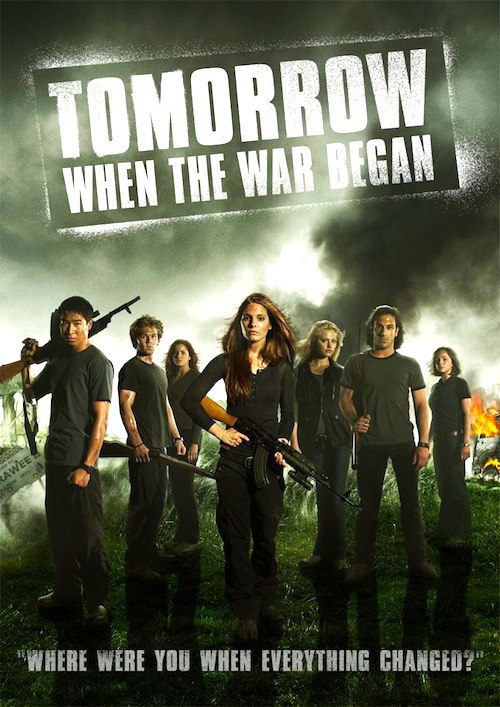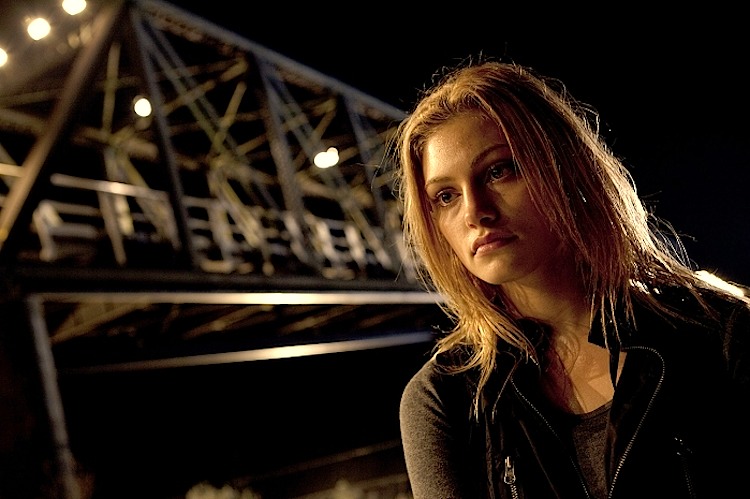By Joe Bendel. The freedom of Australia depends on a handful of teenagers. Fortunately, they are mostly quite good looking. That means they have even more to lose and will therefore be fiercer fighters. A rag tag band of students duly unleash their inner Wolverines in Stuart Beattie’s Tomorrow When the War Began, which opens this Friday in select cities and streams on demand via Freestyle Digital Media’s Facebook platform.
The time is twenty-for hours from now. The place is coastal New South Wales. It is a nice area to grow up and raise a family. At least it was until a foreign military invaded. Ellie Linton and her friends do not know that yet. They have been camping out in a remote mountain clearing misnamed “Hell.” When they return, cell service is out, the land lines are down, and their families are nowhere to be found.
 Eventually, they discover the town’s fairground has been turned into a detention center by a vaguely Asian looking army. After a few narrow escapes and a considerable amount of bickering, they decide it is time to take the fight to their invaders – and that strategically positioned bridge looks like a good place to start.
Eventually, they discover the town’s fairground has been turned into a detention center by a vaguely Asian looking army. After a few narrow escapes and a considerable amount of bickering, they decide it is time to take the fight to their invaders – and that strategically positioned bridge looks like a good place to start.
Based on John Marsden’s bestselling Tomorrow series of YA novels, TWTWB obviously owes a debt to the original old school Red Dawn, but that’s okay. Considering how cool the classic Dawn remains, it is downright bizarre that it has not been emulated more often. Frankly, Beattie somewhat tarries in the first act, establishing full well and good just which teens like whom (Linton has a thing for the Lee Takkan, while the well heeled Fiona Maxwell fancies Homer Yannos, the slightly delinquent son of Greek immigrants).
Still, he juggles a lot of teen angst relatively nimbly. His adaptation also treats evangelical character Robyn Mathers with respect, even when presenting her reverence for life as a source of friction with her less conflicted friends. (Why not just throw some St. Thomas Aquinas books at her? Or better yet, throw them at the enemy.)
On one hand, the conspicuous effort taken to not identify the nationality of the invaders is somewhat problematic (one would think that would be valuable intel to suss out). Based on their rhetoric about natural resources and establishing stability in the Pacific region, China sounds like an obvious suspect. Yet it allows the film to effectively ratchet up the teens’ mood of what-the-heck-is-going-on bewilderment and perhaps sets the scene for big revelations in films to follow.
As Linton and Takkan, the more-or-less leads, Caitlin Stasey and Chris Pang are reasonably charismatic presences and wholly credible action figures. Phoebe “The Secret Circle” Tonkin is also surprisingly engaging as the Clueless-esque Maxwell, but Deniz Akdeniz’s Yannos seems to be looking for a Welcome Back Kotter reboot much of the time.

Once Linton and her comrades get organized and down to business, the film starts cooking nicely. It certainly sets up viewers, leaving us wanting more. Since TWTWB ranks as Australia’s highest grossing domestically produced release of 2010, more is indeed reportedly on the way. That is rather welcome news. TWTWB is certainly fun and professional grade popcorn fare that also seriously addresses themes of freedom, responsibility, and sacrifice. It is exactly the sort of film that could make a mint for Hollywood, but apparently they are content to leave such money on the table.
As is customary for most imports, TWTWB will only open in select cities this Friday (2/24) including the Criterion 7 in New Haven and the Palace 18 in Miami, but it will also be accessible to audiences nationwide, through Freestyle’s digital distribution on Facebook. Recommended as a non-taxing teen action picture with a good message and the promise of even better installments down the road, TWTWB is definitely worth checking out from the comfort of your own laptop.
Posted on February 21st, 2012 at 12:27pm.
From what I understand author John Marsden never states who/where the invaders come from in his series.
Correct. From what I understand, however, the problem this has created for the film is one of racial stereotyping – in so far as most of what the audience knows about the villains is simply that they’re Asian.
I don’t have a problem with the “Red Dawn” homages, because their theme is all about freedom and what happens when you lose it. A rare enough concept these days.
Still, what if you did a “Red Dawn” type story and the enemy remained completely undefined and abstract? “They” could be a foreign power to your own government (due to a coup?) to a new world order army. The point is fighting to get your freedom back, and you don’t need to name names to get that point across.
Ironically, the re-edited Red Dawn remake will be taking more or less the same approach. The villains will be a coalition of Asian communist nations, ostensibly led by the Chinese and North Koreans.
I have mixed feelings about all this because I think there are moments when you actually do need to ‘name names,’ as it were, due to the urgency of the times. We certainly didn’t have a problem naming names when it came to the Nazis or the Soviets, and my sense is that we should get over the squeamishness of identifying Chinese communists as villains. At the same time, I think you’re right in saying that ‘naming names’ isn’t always necessary from a narrative standpoint in order to get a theme across. In fact, as Joe implied in the review, it’s actually the sort of thing that can keep things mysterious and interesting.
Saw this in a special screening and wrote my own review in which I praised it as a war drama as opposed to an action movie. But now I feel compelled to point out, having read this review, that the story simply isn’t about WHO is behind the invasion. From what I’ve read, the books never make that clear. Indeed, the author’s hints pretty clearly preclude any nation that actually exists. Which strikes me as entirely proper. That would change the focus away from the trials and decisions of the characters towards a game of figuring out who is to blame. Political specifics lie nowhere near the heart of this very good motion picture. It is about hard, hard, hard choices and living with them.
As far as the geopolitical background, the film presents that a “Coalition of Nations” on whose behalf someone called “The General” have invaded Australia for a remarkably straightforward reason–resources. Pretty much the same reason the USA invaded the old west. In the books that follow, this ragtag team of fighters go through quite alot, including eventually being airlifted to New Zealand then recruited to help guide professional soldiers dropped behind enemy lines. It really comes across as an epic tale of children turning into adults via a crucible of fire. Not all of them survive of course. And, unlike most Hollywood movies, the killing of a human being is *not* treated as some kind of game. Refreshing, that. And realistic.
But I must point out the story fundamentally is not about political philosophies nor economic systems nor much of a commentary about different nation states. It does proceed from a bias towards Western-style democracy, towards a sense of what-is-fair and it explores the inherent tensions of someone who takes their Christian faith seriously while inside a war! Mostly, though, it focuses on these people. How they live and what they learn, especially about themselves.
This is not primarily a piece of propaganda, and criticizing it for failing to be misses the whole point.